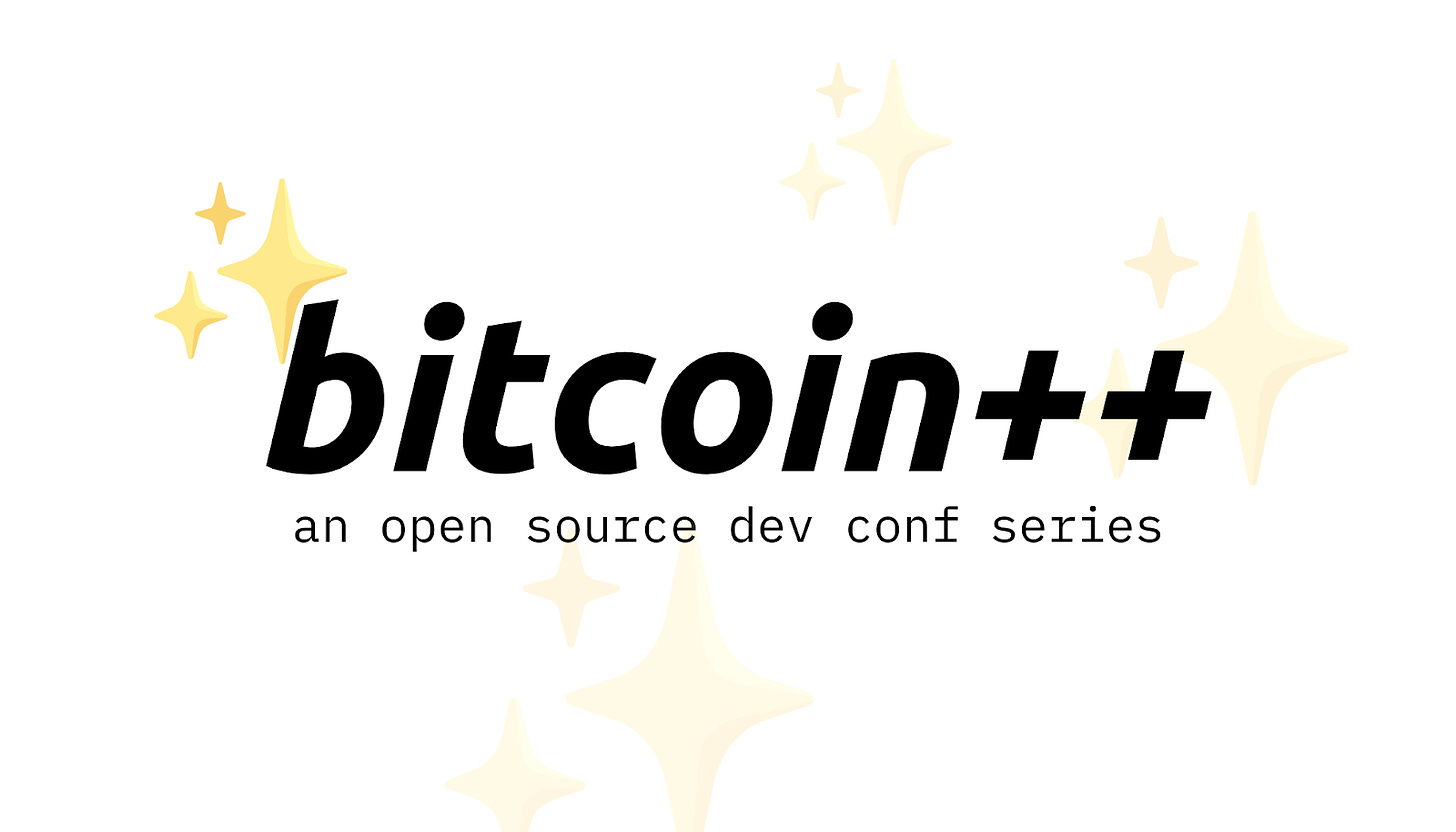bitcoin++ News Edition: Theoretical Physics and Ecash?
A bi-weekly newsletter from the bitcoin++ universe.
Welcome to the second edition of the bitcoin++ newsletter.
We launched our inaugural edition two weeks ago and close to a couple of hundred bitcoin devs have already subscribed. We want to keep that momentum going, so subscribe if you haven’t already, tell a friend, and keep an eye out for new updates every other Thursday.
In this edition, we continue down the ecash rabbit hole with upcoming bitcoin++ speaker and inventor of the Cashu protocol, Calle.
How a Theoretical Physicist Named Calle is Revolutionizing Ecash
Albert Einstein once said, “Look deep into nature, and then you will understand everything better.”
As it turns out, the word “physics” is derived from the Latin “physica” which translates to “study of nature.”
Much like Einstein, budding theoretical physicist Calle turned to what many consider the oldest and purest of the sciences, to better understand the nature of reality.
“The reason I studied physics was just pure interest,” Calle explained during an interview with bitcoin++. “How the universe works is, in my mind, one of the biggest questions that humans can ask.”
But in 2020, Calle found himself asking a different question, one that was more mundane, but it would eventually nudge him towards Bitcoin and ecash – how was he going to accept payments for a web service he was working on?
“I needed a way to monetize the service because it was too expensive to run for free. So that's how I got into Lightning,” Calle said. “Over time, I focused more and more on just Bitcoin.”
Around the same time, he attended a conference where Fedimint inventor Eric Sirion was delivering an overview of the Fedimint protocol.
“I remember him describing how blind signatures work,” Calle said. “And I kept asking, ‘Are you serious? You can take a signature and the changes can still be verified?’”
Eric was explaining how a mint can issue a digital signature to a user’s data without learning the details of that data – which could be an asset such as bitcoin. The asset could then be exchanged for an IOU or withdrawn later.
The mint would still recognize its signature despite the ensuing transactions, but it would never know the exact contents of the data nor the identity of transacting users.
“After that meeting, I almost immediately left the conference and got into a café where I spent the next eight hours reading up on blind signatures, ecash schemes, and old RSA,” Calle said.
Creating Cashu
It would be a couple of years later before Calle made the jump from Bitcoin to Cashu. He had been working on LNbits, an open source Lightning wallet and accounts system.
Fedimint was still in development and there was no other production-ready ecash protocol in sight, so Calle decided to build his own – in less than a week.
“I fully focused, for an entire week, all day and all night long, on just building the first prototype,” Calle explained. “Within the first couple of days, I had what turned out to be Cashu, the protocol today.”
Cashu is a free, open-source Chaumian ecash protocol built for Bitcoin – much like Fedimint. It implements the cryptographic concepts laid out by famed computer scientist and cryptographer, David Chaum in the early 80s.
Calle describes ecash as a digital bearer token similar to physical cash that can be stored on a user's device. The reason a user would opt for Cashu or any other ecash system instead of standalone bitcoin is for the privacy and scalability benefits ecash confers.
So what’s the difference between Cashu and Fedimint? The obvious distinction is that unlike Fedimint, Cashu doesn’t use a federated mint where trust is distributed over multiple parties. But despite the increased centralization risk, Cashu has several benefits that make it an attractive option.
“One major difference between Cashu and Fedimint is that Cashu is a protocol,” Calle explained. “That means Cashu has a specification that is in English language documents, which you can read on GitHub and implement your own implementation of Cashu. It has been done dozens of times before,” he added.
To be fair, Fedimint also describes itself as a protocol, but what Calle is highlighting is the existence of a Cashu specification that is separate from the various implementations. Cashu is also simpler and more nimble.
“Running a Cashu wallet or a server is generally more lightweight,” Calle said.
What to expect from Calle’s keynote at bitcoin++ Berlin
Calle will be speaking at bitcoin++ in Berlin, Germany on Friday, October 11 at 10:30am (get your tickets here).
“I'm looking forward to talking about some of the theoretical basics of the ecash cryptography that we're using, and things that could be added on top of it in the future,” Calle said.
He wants to show other developers that ecash opens up a world of possibilities beyond mere wallet software.
Calle also wants to encourage Bitcoin developers to seek funding opportunities given the ever-increasing number of grants available in the space.
“Working on open source gives your life a lot more purpose and also gives you a lot more freedom than working in a conventional job,” Calle said.
Upcoming bitcoin++ events:
Ecash edition in Berlin, October 11-13 at w3 hub. Grab your tickets before we sell out.
Hack + beach edition in Florianopolis, Feb 19 - 22, 2025. Venue coming soon, but tickets are already available here.
Mempools edition in Austin, Texas May 7 - 9, 2025 at the Palmer Event Center. Super early bird tickets are already available.
Other news and announcements
Volunteer at bitcoin++ Berlin
If you’re interested in shaping one of the top technical Bitcoin conferences – and having some fun in Berlin while you’re at it – apply here to volunteer for bitcoin++ Berlin.
BDK Seeking Full-Time Open Source Rust Maintainer
The Bitcoin Dev Kit (BDK) Foundation is seeking proposals for a full-time Rust maintainer to support the ongoing development and maintenance of the BDK suite of open source software. Submit your grant application here.
Fedi and Friends Invites you to Save the Date – and Your Coffee – for the First eCash Coffee Day!
Bitcoin has pizza day, ecash has coffee day. Join us as we celebrate the first-ever real purchase made with ecash backed by bitcoin – a hot delicious coffee bought by Eric Sirion. Can you guess where it happened?
The celebration will take place on October 3rd, and will feature various activities within the ecash/Bitcoin community. We’ll be releasing more details via the bitcoin++ X and nostr accounts (as well as via this newsletter), so stay tuned for more info. Let’s get caffeinated and celebrate!
Privacy Unconference at Paralini Polis Oct 3rd, ahead of HCPP
After you’ve had your coffee, join Bitcoin Layers at their first bitcoin privacy unconference at Paralelni Polis, Prague also on October 3rd. The unconference will be a small, intimate event focused on driving R&D outcomes for the privacy landscape. Developers and researchers interested in Bitcoin privacy are invited to attend. Please email janusz@lxresearch.co to express interest! You can learn more about the event at privacyunconf.bitcoinlayers.org.
Maelstrom Bitcoin Developer Grant Awarded to Rkrux
Digital asset investment fund Maelstrom (managed by the family office of Arthur Hayes, co-founder of BitMEX) announced on Tuesday that it had awarded a full-time Bitcoin Core grant to software engineer Rkrux.
Rkrux is new to Bitcoin Core and has been reviewing pull requests since March 2024. He completed the Chaincode Labs Bitcoin FOSS program earlier this year. Check out his GitHub profile: https://github.com/rkrux
Q: What made you become a Bitcoin developer?
A: I entered the Chaincode FOSS program in January 2024 and then since March 2024 I started trying to assist with the project by reviewing pull requests, testing releases, finding bugs, and asking questions to the other developers.
Q: How will this grant impact you personally, and how will it impact the broader Bitcoin ecosystem?
A: This grant allows me to quit my job as a blockchain engineer and focus entirely on open source Bitcoin work. This is a major change for me and a big risk. I live in Asia and have not met any other Bitcoin developers in person. This grant will give me the time and financial resources to travel to technical Bitcoin events across the world and get to learn more about Bitcoin Core.
Q: What component of Core will you be working on?
A: At the start I want to continue and accelerate my review work across the codebase. Later on I would like to get to a position where I can submit my own PRs, most likely in the areas of the cluster mempool or package relay.
Who else is speaking at bitcoin++ Berlin
We’re anticipating a full schedule of talks and workshops at our upcoming event in Berlin this October 11-13. Here’s a full list of who’s currently confirmed to attend:
· Bob Scully – Boardwalk
· Brad Stachurski – Fedimint
· Calle – Cashu
· Calvadev – Shopstr
· Egge – npub.cash
· Eric Sirion – Fedimint
· Gudnuf – Boardwalk
· IroncladDev – Fedi
· Joschisan – Fedimint
· Justin Moeller – Fedimint
· Lefteris & Tacio – Fedi
· Leito – Nutmix
· Max Hillebrand – Cypherpunk
· Niftynei – Base58
· Orkun Mahir Kılıç – Citrea
· Oscar Lafarga – Fedi
· Rachel Rybarczyk – Stratum Reference Implementation, John Street
· Shaurya Arora – Fedi
· Super Testnet – Independent
· thesimplekid – Cashu Dev Kit
· Vnprc – Triangle BitDevs







